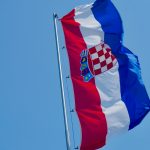ZAGREB, October 8, 2019 – High state delegations on Tuesday laid wreaths at Zagreb’s central cemetery of Mirogoj on the occasion of Independence Day, October 8.
Prime Minister Andrej Plenković, Parliament Speaker Gordan Jandroković, and the envoy for President Kolinda Grabar-Kitarović, Anamarija Kirinić, laid wreaths in front of the central cross in the Alley of Fallen Croatian Defenders, at the grave of Croatia’s first president Franjo Tuđman and at the common grave of unidentified victims of the 1991-95 Homeland War.
After the wreath-laying ceremony, President Grabar-Kitarović, PM Plenković and Parliament Speaker Jandroković attended mass for the Homeland in St. Mark’s Church.
A changing of the Honour Guard outside the government and parliament offices in St. Mark’s Square is expected to take place at noon.
Defence Minister Damir Krstičević today issued a message of congratulation to all Croatian citizens, notably defenders and families of defenders killed or gone missing in the war, stressing that it was because of them that Croatians today lived in a free and independent country.
“Today we have a duty to build Croatia’s future based on the values of the Homeland War, which is the foundation of the modern Croatian state,” the minister said in the message, among other things.
Independence Day is observed in memory of 8 October 1991 when the Croatian parliament unanimously decided to sever all state and legal ties with the other republics and provinces of the then Socialist Federal Republic of Yugoslavia (SFRY), whereby Croatia became an independent state.
The parliament also decided that it no longer recognised as valid any legal act of anybody acting on behalf of the former federation, which no longer existed as such, and voted in 15 laws required to bring to life an independent and sovereign Republic of Croatia.
Previously, the parliament adopted a constitutional decision on independence and sovereignty on 25 June 1991, but its entry into force was postponed for three months based on the Brijuni Declaration of July 7, adopted at the initiative of the European Commission in an effort to help peacefully resolve the Yugoslav crisis.
After the moratorium expired, in the afternoon of October 7, planes of the Yugoslav People’s Army (JNA) bombed Zagreb and the Banski Dvori in St. Mark’s Square, the residence of the then state leadership headed by President Franjo Tuđman, killing one person and wounding four. Other buildings in St. Mark’s Square were damaged as well.
Due to security reasons and possible new attacks on Zagreb, the parliament was relocated to the basement of the oil company INA’s building in Šubićeva Street, where the historic decision on independence was adopted.
More on history can be found in the Politics section.







